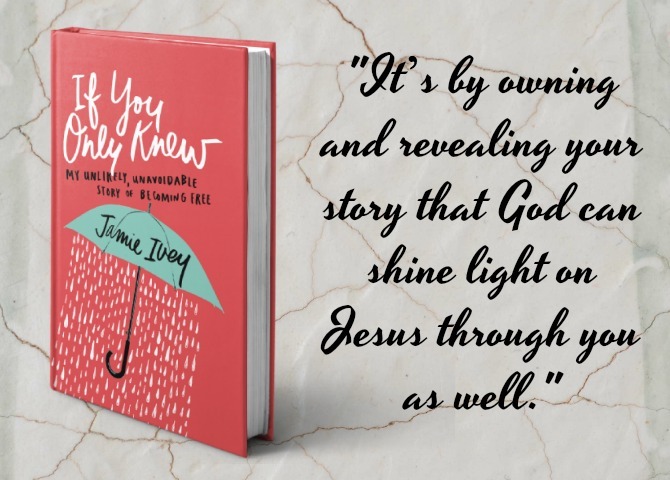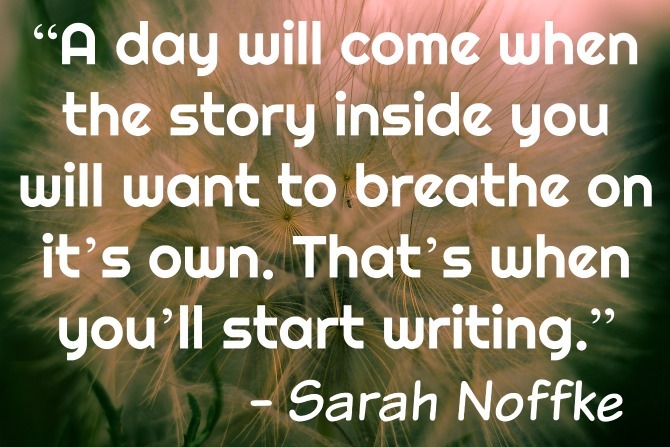A few months ago I read Jamie Ivey’s memoir, If You Only Knew.* In her book, Jamie candidly shares her testimony in all of its messiness. After disclosing the deepest, darkest secrets from her past, Jamie gives God full glory for redeeming her story. Because of Christ, she came to realize that her past wasn’t something to be ashamed of, or something that kept her from being a useful tool in God’s Kingdom. Rather, her story was the very thing that made her an effective light for Christ. She writes, “When seen through the eyes of the gospel, our stories are not obstacles to our freedom; they are actually the key to unlocking it.” She then encourages her readers to open up about our own stories.

I was inspired by Jamie’s message. I, too, am a firm believer in the power of story. This conviction that our stories matter, that amazing things can happen when we share our stories and listen to others’, is a primary motivation for keeping up with this blog. I struggle, though, with knowing how much to share. When I sit down at my keyboard to compose a post, I offer windows into my life; these inside glimpses can be helpful (for me as I pull back the curtains, and for you, my readers, as you take a peek inside), but I worry that sometimes I reveal too much, or that the snapshot I’m offering up could in some ways be harmful. I would never want my words to obscure Christ’s light, and sometimes it feels as if that is exactly what I’m doing.
I’d been mulling over these thoughts for a few weeks when my answer came to me through an unexpected source: Glenon Melton Doyle isn’t someone I generally agree with, but I admire her personal vulnerability and willingness to share her life with such transparency, so when I heard her discussing her discernment process regarding what she chooses to disclose, my ears perked up. I’m butchering the quote here, but she essentially said, “I only share from the healed-up scars of my past, never the open wounds.” She went on to explain that there is a deep time delay involved in her writing: often, many years have passed between when an event occurs and when she shares it publicly. Only once she has fully processed and healed from an issue or personal pain does she share that pain with her audience.
This simple piece of advice—share from the scars, not the open wounds—was freeing to me in a way I can’t fully explain. As someone who craves authenticity in others, I work hard to present myself (in real life, and in my writing) in the most true and genuine way. And when I omit aspects of my current journey, I feel as though I am presenting an incongruous picture of me and my life’s story. At times this has led me to disclose portions of my journey that were incredibly painful to share; I bled out into my writing, and though well intended, it resulted in vulnerability hangovers for me, and confusion or unnecessary feelings of helplessness for the witnesses to my premature revelation and introspection.

Stepping away from myself for a minute, I think we’ve all been privy to shared wounds that are still fresh and oozing. These stories are murky, lacking the clarity that some distance from the hardship could provide. We cannot yet see the redemption that is likely ahead, and the effect is often a demoralizing one. We are unable to discern the intent behind the disclosure—are we expected to offer comfort? advice? simply listen?—and when our response is ineffective, it rubs salt into the wounds of the individual who has gifted us with her vulnerability.
That’s not to say I believe we should never share from our current pain. We absolutely should welcome close friends and family into our present trials. And there are times when it’s acceptable to share pain in real time with a wider audience as well. Not every story needs to be concluded and presented with a tidy bow in order to be helpful. I’ve benefitted from witnessing others as they trust God with a story that is incomplete. For myself, I’ve frequently found catharsis through the writing and sharing of a current hardship: some people process verbally, I process through writing, and I’ve discovered that I sometimes need to write through my pain in order to get to the other side of it. Some wounds require me to share them in order to become scars that point to a story bigger than my own.
So where have I landed on this issue? I think it’s safe to say that I haven’t yet arrived at a conclusion, or maybe that I’ve arrived at too many of them. I’ll share from the pain when I think that I need to; I’ll hold back on sharing when I still need some space. I won’t feel disingenuous when I keep parts of my present journey to myself, nor will I resent others who are doing the same. Ultimately, I will have faith that every aspect of my story can and WILL be redeemed, and that it will one day be used to point others to Jesus.

*My copy was gifted to me by a friend who got to hear Jamie speak at the IF: Gathering; she knew that I was a Jamie Ivey fangirl, and was so sweet to pick up the book for me at the event.
[…] Sharing From Our Scars ~ On balancing vulnerability and privacy in the pursuit of healthy authenticity. […]
[…] issue as one’s body size. She admits that she is still in the middle of her journey; she is not sharing from her scars, but from open, oozing wounds. This is a frightening place from which to write, and while it makes […]